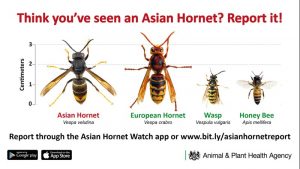The hornets are an invasive pest first seen in the UK in 2016, after which it’s feared that their increasing numbers could have a catastrophic impact on British honeybees and other pollinators.
NFU senior regulatory affairs adviser Chris Hartfield says the Asian hornet is a large wasp native to China, India, and Korea. “Although slightly smaller than our native European hornet, this invasive pest is a voracious specialised predator of honeybees, capable of wiping out beehives.
“A single Asian hornet can kill up to 60 honeybees every day. It can also predate a range of native insects like bumblebees, flies and spiders. By doing so, it can alter the biodiversity in regions where it is present, and it can be a health risk for people allergic to wasp stings,” he added.
People are urged to download the Asian Hornet Watch app to report potential sightings quickly.
Nests of the Asian hornet can vary from tennis ball-sized early in the season, to the size of a football and larger in the summer and autumn. Nests are often well camouflaged and hard to see, but early season nests can be found in brambles, hedges, and building and roof spaces.



